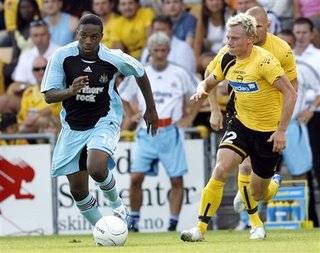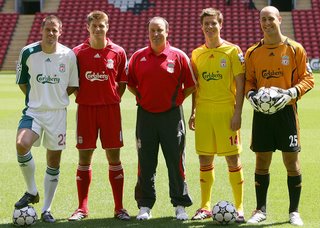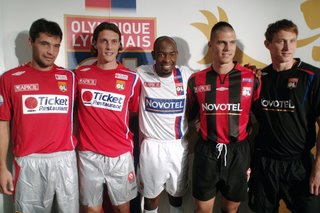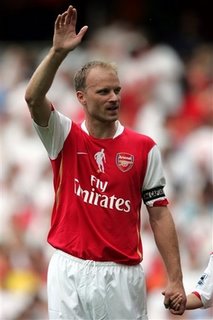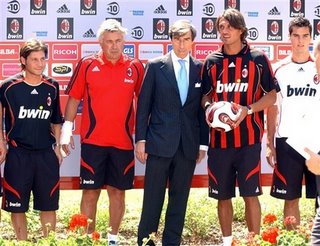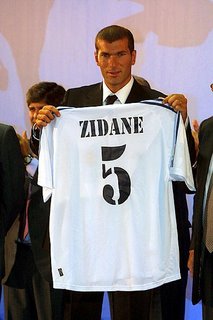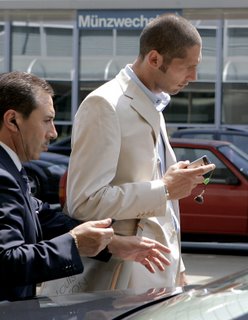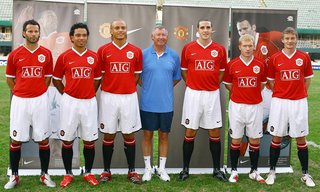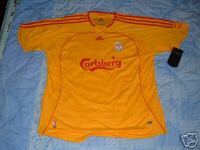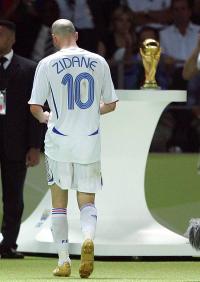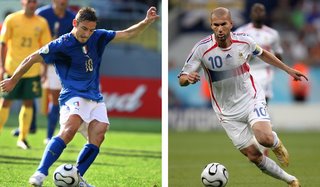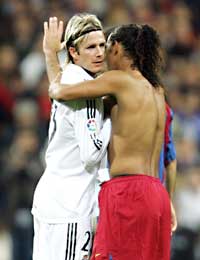 Beckham congratulates Ronaldinho on his exhibition in the Bernabeu, the latest example of the contrasting fortunes in soccer's greatest rivalry.
Beckham congratulates Ronaldinho on his exhibition in the Bernabeu, the latest example of the contrasting fortunes in soccer's greatest rivalry.There are a lot of great rivalries in world soccer: Celtic-Rangers in Scotland, River-Boca in Argentina, Inter-Milan and Roma-Lazio in Italy, Palmeiras-Corinthians and Flamengo-Vasco in Brazil, Galatasaray-Fenerbahce in Turkey, ManU-Liverpool and Arsenal-Spurs in England, and Marseille-PSG in France all come to mind. What makes these rivalries so special is not always the quality of footie on display, but the passion that they invoke in players, fans, and even impartial spectators alike. Most soccer fans can barely grasp the full depth of the Celtic-Rangers rivalry, but no fan can watch one of their Old Firm battles and not find themselves passionately rooting for one team or the other. And what can set an exceptional rivalry apart from a great one is that the division that it causes can not only be felt within one city, but throughout a country or even the world; the Celtic-Rangers rivalry divides not only Glasgow, but rather permeates all of Scotland, all of Britain, and even other parts of the globe. But as great as all of these rivalries are, there is one 'superclasico' in world soccer that stands out from all the rest: Real Madrid-Barcelona.
Most fans would tell you that what makes Real-Barca so special is the amazing array of talent that is always on display in these Spanish derbies. This past year, the likes of Ronaldo, Ronaldinho, Raul, Etoo, Zidane, Deco, Beckham, Xavi, Robinho, Messi, Roberto Carlos, Puyol, Casillas and Larsson all graced the grass of the Bernabeu and Nou Camp. Few rivalries can boast of that much footie firepower, but some can: Juve-Milan and Chelsea-Arsenal can both at least claim to belong in the same conversation, but neither rivalry has half of the national impact, lengthy history, and widespread passion of Real-Barca. For any soccer game to reverberate so strongly in every inch of Spain and other parts of the world, the rivalry must be rooted in something immensely powerful, something that cuts far deeper than anything that takes place on a football pitch - and so it is with Real-Barca.
In
Pulp Fiction, Mia is interviewing Vincent before he takes her out to dinner. Wanting to find out what type of person he is before they go out, she says, "My theory is that when it comes to important subjects, there's only two ways a person can answer. For instance, there's two kinds of people in this world, Elvis people and Beatles people. Now Beatles people can like Elvis. And Elvis people can like the Beatles. But nobody likes them both equally. Somewhere you have to make a choice - and that choice tells me who you are." Now Mia might have had some coke issues and an atrocious Fox Force Five joke, but she was right about making choices in life; and the same theory applies to Real-Barca: you have to make a choice - and that choice says a lot about who you are as a person. There might be other rivalries in sports that also carry such weight - Yanks-Red Sox in baseball, for one - but even that doesn't come close to Real-Barca. Take Lakers-Celtics in basketball, add more than a century of history and politics and oppression, spread it out all over the country, and you're still not up to the level of Real-Barca. Like Real-Barca, though, the Lakers-Celtics rivarly involved two of the biggest and most unique cities in the country: you're either an L.A. person or a Boston person, period. You either like the sunny, glitzy, glamourous, laid-back, new-age, clubby, surfer scene of Hollywood or the hard-nosed, working-class, historic, old-fashioned, pub-crawling lifestyle of Beantown. In Spain, the dichotomy of Real-Barca starts there, in the differences between the two cities of Madrid and Barcelona.
You need look no further than a map to start to understand the difference between these two, great cities. Madrid is located right smack in the center of Spain; as such, it considers itself the heart of the country. The main plaza in the city, Plaza del Sol, is viewed as the center of the entire nation, the heart of the country, the starting point from which all roads stem. Ever since Phillip I, son of Charles I of Spain, moved the court from Toledo to Madrid in the 16th century, Madrid has been the capital. Simply put, Madrid is the center of all things Spanish: traditional, historic, and conservative. On the other hand, both geographically speaking and otherwise, Barcelona is as far from Madrid as possible, isolated over on the Northeast coast just off the Mediterranean - it is cosmopilitan, liberal, opinionated, and unique. Although Barcelona might appear to be a Spanish city on the map, it's not that simple.
Ever since the Spanish Civil War, which lasted from 1936-1939, Barcelona, capital of the region of Catalonia, has led the fight for Catalonian independence from Spain. During the war, the Nationalists, led by Francisco Franco, made their base in Madrid, while the Loyalists (of the Second Spanish Republic) mostly came from the Republican strongholds of Asturias, the Basque Country, and Catalonia. The two latter regions were the base for a very strong separatist movement, one that would lose to Franco's Nationalist forces, supported by the Fascist nations of Germany and Italy, and would later have to suffer at the hands of Franco the consequences for daring to want to secede from Spain. After his victory, Franco would go on to rule Spain as a dictator for the next 36 years, during which time he centralized power in Madrid, a move which only made the Catalan independence movement grow stronger. Franco, of course, was a fervent supporter of the capital's team, Real Madrid.
During the war, Barcelona's president Josep Sunyol was killed; after it, Franco would give considerable institutional support to Real, helping to usher the club into a period of incredible successes on the pitch - "los Blancos" would win the European Champions League six times and la Liga a whopping 15 times during Franco's reign (and get more than their fair share of refereeing decisions along the way). While Franco was in power, Real was known as the "Regime Team" and, accordingly, Barca suffered - not only was the Catalan language and flag banned, but Barca never once won the Champions League and suffered through one of the worst periods in club history during the 1960s and 70s. Upon Franco's death in 1975, Barca's fortunes improved. Not only could banners reading "Catalonia is not Spain" be seen in the Nou Camp, but the club signed the Dutchman Johan Cruyff, who endeared himself to Barca's fans off the pitch by giving his son a Catalan name (Jordi) and on it by helping Barca win la Liga for the first time since 1960. Cruyff returned to Barca in the late 80s as manager, assembling what would be known as the "Dream Team" and leading the club into a period of immense success. Coincidence? Maybe, but either way a clear pattern had been established: when Real is doing well, Barca isn't. And vice versa.
With a history so dominated by political division and even a war, it is no wonder that the Real-Barca rivalry is felt throughout Spain. Every fan in the country supports one or the other. In most cases, fans support their local club and then one of the two worldpowers; an 'aficionado' in, say, Sevilla might be a fanatical Real Betis supporter, while also rooting passionately for Real Madrid to beat Barca. In most cases, a fan's choice reflects their political leanings: for example, the vast majority of the fans in the Basque Country, allied with Catalonia in the Civil War, support Barca. When I lived in Spain, I lived just down the street from Madrid's Bernabeu stadium, so naturally I became a fan of Real. Later that year, we travelled to Barcelona for the weekend, hoping to catch the superclasico between Real-Barca; on Saturday night, I donned my classic white Real Madrid jersey and we headed off to the Nou Camp. As we pulled up to the stadium's metro stop, a friendly Barca fan turned to me and said "I'd lose that jersey if I were you - trust me"; as he said that, I could hear the growing roar of fans on the street above - point taken. When we got up to the street, we saw the Real team bus pulling up to the stadium - never have I seen such a torrent of objects: the bus was pelted with a veritable grocery list, from eggs to tomatoes, but also more than a few rocks, one of which shattered a window. The police, surely mostly Barca fans, didn't seem to mind, but from the looks of the ghost-white players seen in the bombarded bus, the Real players thought otherwise. Still, as Real would come to find out a few years later, Barca fans have a thing for throwing some, er, interesting objects when their arch-enemy comes to town.
The Real-Barca rivalry reached a fever pitch in 2000. Real was in the midst of a presidential election when one of the candidates, Florentino Perez, claimed that if he were elected, he would sign Barcelona's superstar winger, Luis Figo. At the time, Figo, the fan favorite of Barca and one of the world's best players, was embroiled in a contract dispute with Barca's president, Joan Gaspart; Perez knew that he could capitalize on this strained relationship, but also on the fact that the Spanish system allows players to be bought simply by a club paying that player's fixed transfer fee with the Spanish soccer federation (and not deal directly with that player's previous club, as is the case in other countries such as England and Italy). Perez also knew that no player in the world would entice Real Madrid fans to vote for him more than the face of Barca, Luis Figo. Perez won in a landslide, deposited Figo's $58 million transfer fee with the federation, and presented Figo to Madrid's ecstatic supporters at the Bernabeu. Barca, both the city and club, was irate. When Figo returned to the Nou Camp for the following year's Real-Barca game, everything from whiskey bottles to a pig's head (yes, you read that right) rained down upon Figo every time he went to take a corner kick. Real would win la Liga that year, followed by their record 9th Champions League title the next year, and then la Liga again in 2002-03; Gaspart never recovered, resigning under unrelenting pressure in 2003.
From 1996 to 2004, the president of Spain was Jose Maria Aznar, a huge Real Madrid fan. Barca's fans would consistently complain of refereeing decisions that went against their club; of course it is easy to cry foul when your team is losing, but some of the decisions were more than a bit surprising. In the 2004 elections, Aznar was defeated by Jose Luis Rodriguez Zapatero, a Barcelona fan; that same year, Angel Maria Villar was re-elected as president of the Spanish soccer federation. Barca, too, had a new president: Joan Laporta. All of a sudden, the refereeing decisions started took a discernible turn in favor of Barca. Again, this coincided with real, tangible, factual developments in the club, but now it was Real Madrid's turn to cry foul. Barcelona was winning everything: Laporta hired Dutchman Frank Rijkaard as coach, signed Brazilian wunderkind Ronaldinho and, in a stunning turn of events, managed to convince Perez to sell him Cameroonian striker Samuel Etoo, a product of the Real Madrid youth system. The signing of Ronaldinho was also intriguing because originally, Laporta had not wanted the Brazilian; in fact, Laporta had made a Perez-like election promise of signing David Beckham. Beckham, though, turned down Laporta's offer and signed with Real Madrid, so Laporta turned to Ronaldinho. This was a fitting development,since both players are perfect for their respective clubs and their traditions: Beckham is a conservative, image-conscious icon, while Ronaldinho is symbolic of all things Catalan: fun-loving, rebellious, and audacious. Ronaldinho and Etoo, combined with other signings like Rafael Marquez and Deco, as well as youth players like Carles Puyol and Lionel Messi, would go on to lead Barcelona to back-to-back Liga titles and only their second Champions League title in their history. A year ago, during Barca's celebrations, Etoo sent the Madrid fans into uproar and the Barca fans into delirium by chanting "Madrid cabron, saluda al campeon!" ("Madrid you motherf***er, salute the champs!"). Later that year, Ronaldinho was awarded FIFA's World Player of the Year award. And what of Real, you ask? Beckham has yet to win a single title in his first three seasons in Madrid, one of the worst title droughts in club history.
As always, this past year Real played Barca twice. Barca romped to a 3-0 win in Madrid's Bernabeu fortress on the strength of a goal by Etoo and two Ronaldinho masterpieces. In a rare show of good sportsmanship between the two rivals, Madrid's fans couldn't resist applauding Ronaldinho's brilliance (or maybe there were just no pig heads at arm's reach). Meanwhile Madrid, Beckham included, was whistled off the pitch. In the rematch in Barcelona's cavernous Nou Camp, the two teams battled to a draw; Real got a goal from Ronaldo, but some dubious refereeing led to a Ronaldinho penalty and Roberto Carlos red card and Barca went on to get the draw they needed to keep them comfortably ahead of Real in the title race - times, it seems, have changed.
Just last week, the paths of Real and Barca crossed once again. Perez is history now and their new president, Ramon Calderon, wanted to please his new coach, Italian Fabio Capello, by signing some players from his former club, newly relegated Juventus. Calderon and Capello particularly had their eyes on some Juve defenders to shore up Real's porous backline: Fabio Cannavaro, Emerson, and Gianluca Zambrotta. Enter Barca and Laporta, who sent his number-two, Txiki Begiristain, over to Turin to steal Zambrotta out of Real's fingertips. Juve, taking advantage of the situation and rivalry, demanded that Barca agree to purchase aging French defender Lilian Thuram, too. Barca agreed. Now, Barca has upgraded an already powerful squad, while Real is left without a leftback to replace the unhappy Roberto Carlos. As always with Real-Barca, it is a question of black and white, night and day, yin and yang.
In Spain, the rivalry between Real Madrid and Barcelona is far more than just a soccer game - it is a rivalry deeply rooted in history and politics, one that spans the course of a nation torn apart by regional differences, a hatred that permeates that entire country. So this October, when you and a million other aficionados tune in to watch los Blancos battle los Blaugrana, remember that you're watching a game that transcends Ronaldo, Etoo, Beckham, Ronaldinho, Robinho, Messi, Raul and Puyol - you're watching a rivalry that includes everything from Phillip I and Francisco Franco to Luis Figo and a pig's head. Real and Barca are still immersed in a timeless dance that neither one can do without, everyone can play, and no one can resist. After she had finished interviewing him, Mia said to Vincent later that night at dinner, "Now I wanna dance, I wanna win, and I want that trophy - so dance good!" In the passionate rivalries of world soccer, Real and Barca can dance better than anyone.
 Juventus general manager Luciano Moggi on his way to court, where titles are won or lost in today's sports world.
Juventus general manager Luciano Moggi on his way to court, where titles are won or lost in today's sports world.